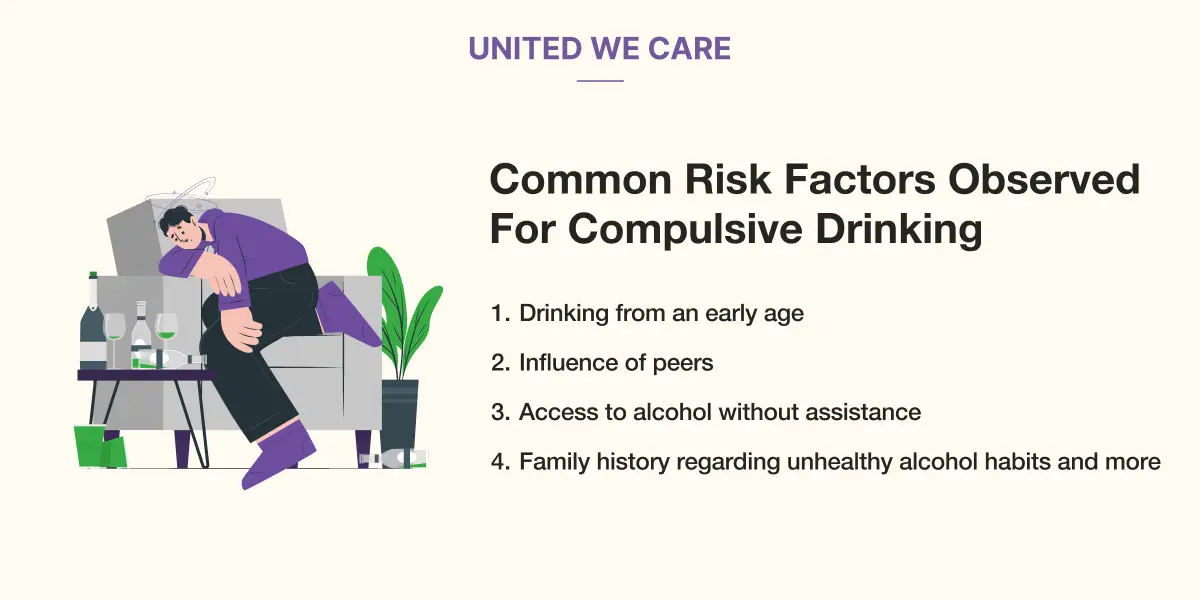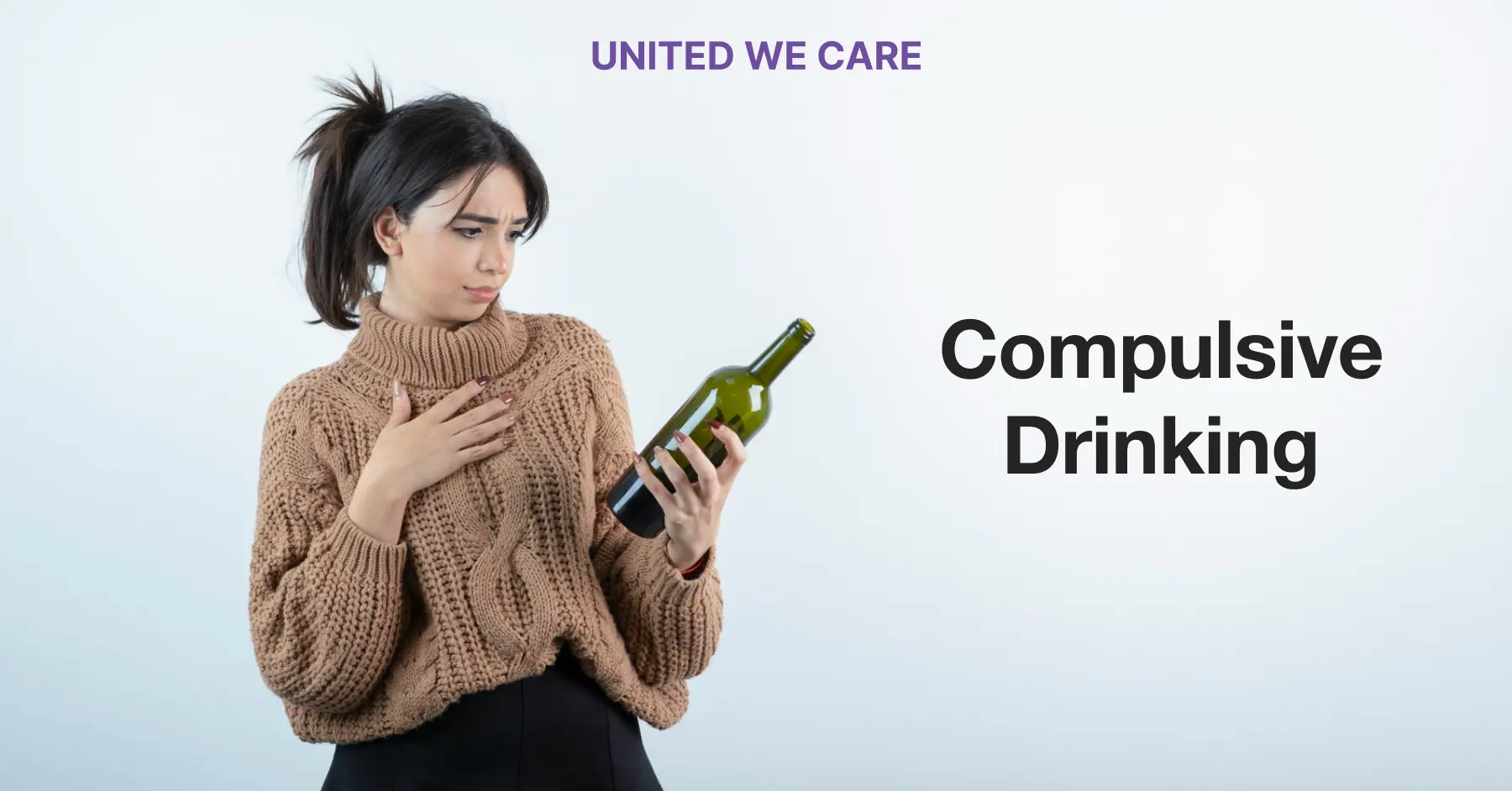Introduction
Alcoholism, also known as compulsive drinking, is a chronic condition where one is unable to control their drinking habits. This is evidently noticed even when a person is facing negative effects due to this condition. It indeed affects relationships, health, and even the social nature because of the consequences caused.
What is Compulsive Drinking?
A pattern or developed habit of alcohol consumption, which is usually accompanied by an urge to drink, is compulsive drinking. In addition to this, the addiction involves failure to control the amount and frequency of drinking. However, it is important to note that it is different from binge drinking. Because of that, a person consumes a lot of alcohol in less time. However, it should be noted that binge drinking eventually presents a rise in the danger of compulsive drinking.
Common Risk Factors Observed for Compulsive Drinking
Besides, compulsive drinking is caused due to a variety of factors. These usually involve genetics, environmental, psychological, and even biological conditioning. Furthermore, there are several common risk factors observed for compulsive drinking, such as:

- Drinking from an early age
- Influence of peers
- Access to alcohol without assistance
- Family history regarding unhealthy alcohol habits and more
But it is important to acknowledge that it can also be dealt with healthily through rehabilitation, medication, and counseling.
Effects of Compulsive Drinking
Compulsive drinking affects one’s life negatively, and this can be noticed in a variety of aspects of one’s life. Following are some of the areas of lifestyle that are evidently affected:
Physical Health
Firstly, compulsive drinking makes one’s organs and overall immune system weak. In addition to this, it makes them oneself more prone to diseases and infections that can be life-threatening.
Psychological Health
Secondly, a person either starts to drink due to a saddening life event or causes wrong decisions regarding life due to drinking. This only leads to worse life conditions along with dependency on alcohol to deal with issues of life. The use of alcohol compulsively allows more scope for mental health disorders or alcohol-related psychosis, delirium, and dementia.
Social and Personal Relationships
It should be noted that compulsive drinking makes you unable to function properly in social settings. This eventually leads to a decrease in the quality of relationships. This is due to the inability to maintain relationships with others and even oneself, leading to isolation.
Financial and Legal Issues
Excessive use of alcohol might make a person face financial difficulties due to an inability to focus and function. Along with this, finally, one might even end with some legal trouble when under the influence.
Mental Health and Compulsive Drinking
Mental health is indeed affected very evidently because of compulsive drinking. Not only this, but mental health disorders and also compulsive disorders co-occur. A condition like this is referred to as a dual diagnosis. Along with this, it should be noted that these two can influence each other significantly. Moreover, it makes the symptoms of each other worse in the following ways:
Effect on Each Other
Mental health disorders increase the risk of drinking compulsively and losing control over it with time due to a variety of issues. It can prove to be a coping mechanism. Additionally, compulsive drinking can cause or worsen already existing mental health disorders.
Negative Impact
Both of these have a negative impact as it affects the treatment and the recovery process. Along with this, effectiveness and outcomes are also affected, which only leads to a worse lifestyle practice.
Risk Factors
These two have shared and similar risk factors as well. This involves genetic, biological, and psychological risks to one’s life.
Hence, if a holistic approach is adopted, then a comprehensive treatment process can be practiced.
5 Tips To Overcome Compulsive Drinking
Because compulsive drinking is a chronic condition, it can be hard to deal with and treat. But with the right understanding and dedication, the treatment can be implemented effectively. Following are some of the tips to try to overcome compulsive drinking:
Acknowledge, Accept, and Go!
In order to go ahead with the treatment, one first needs to acknowledge that they have been drinking compulsively. Once done, then realistic and specific goals should be made to improve. In addition, seek help as per your requirements. You can also check United We Care for support and suggestions.
Understand Yourself and the Process
Secondly, it should be noted that one should understand the process of treatment as it requires commitment and patience. Not only this, but one should also identify what triggers them to understand what the situations to avoid are.
Don’t be Afraid to Ask for Support
To overcome this urge to drink, support and a strong network serve as key aspects that help. In the recovery process, having a space proves to be a healthy addition.
Connect with United We Care
Moreover, to have the support that is tailored to your needs, check in with Kariefy. Here, you can explore your options and have all your needs met to improve and get over your compulsive drinking habits.
Celebrate Small Wins
Last but not least, reward yourself as you can meet your small but realistic milestones. Practice positive self-affirmations to boost one’s self-esteem and keep going.
Treatment of Compulsive Drinking
After considering one’s condition and preference for the duration and severity, one can decide on the treatment to overcome compulsive drinking. There are common methods as per the following that help:
Medication
Firstly, Disulfiram, Naltrexone, and Acamprosate are some of the medications prescribed. These usually cause unpleasant reactions or decrease the pleasure one experiences due to alcohol consumption.
Rehabilitation Programs
Secondly, it is a structured way to deal with compulsive drinking through a safe and supportive environment. In addition, you get options like day programs, partial hospitalization programs, or aftercare. Considering these, you can pick one that suits your needs.
Therapy or Self-help Groups
Lastly, cognitive behavioral therapy and motivational enhancement therapy are some of the therapies that are proven to help. Through this, you can get a better understanding of yourself. Along with these benefits, this method introduces better support and peer relations.
Conclusion
Compulsive drinking is a serious condition that can have a negative impact on one’s whole life. Furthermore, this includes health, relationships, and overall social and mental well-being. It is usually caused by a variety of factors, which can be genes, surroundings, and events that affect one’s mental well-being.
However, compulsive drinking can be treated and dealt with in a healthy manner. Additionally, achieving this requires personal commitment and positive external support. Through self-help groups, medication, therapy, and rehabilitation, this can be gotten over with. If one is dedicated enough to acknowledge the problem, avoid the triggers, and set realistic goals, they can overcome it.
Hence, everyone should importantly recognize the fact that compulsive drinking is not a hopeless case. As one heads on to the journey of destroying devastating habits with dedication, it is possible to end compulsive drinking effectively.
References
- C. Siciliano, A. L. Jones, A. C. Holley, A. J. Kreeger, S. L. Parylak, F. Rivnay, K. J. Parker, K. M. Tye, and K. Deisseroth, “Distinct neural activity patterns underlie compulsive alcohol drinking in rats,” Science, vol. 366, no. 6468, pp. 1008-1012, 2019.
- D. L. Luca, E. Owens, and G. Sharma, “The effectiveness and effects of alcohol regulation: evidence from India,” IZA Journal of Development and Migration, vol. 9, no. 4, 2019.
- S. Glenn, J. L. Maggs, and J. Schulenberg, “College students suffer more than 100 alcohol-related consequences: Implications for understanding and measuring alcohol-related harm,” Alcoholism: Clinical and Experimental Research, vol. 46, no. 10, pp. 2090-2100, 2022.
- A. M. Roche, V. Kostadinov, J. Fischer, A. Nicholas, R. O’Rourke, and K. Pidd, “Addressing the social determinants of inequities in alcohol consumption and related harm,” Health Promotion International, vol. 31, no. 2, pp. 261-273, 2016.
- J. Rehm, C. Mathers, S. Popova, M. Thavorncharoensap, Y. Teerawattananon, and J. Patra, “Global burden of disease and injury and economic cost attributable to alcohol use and alcohol-use disorders,” The Lancet, vol. 373, no. 9682, pp. 2223-2233, 2009.





